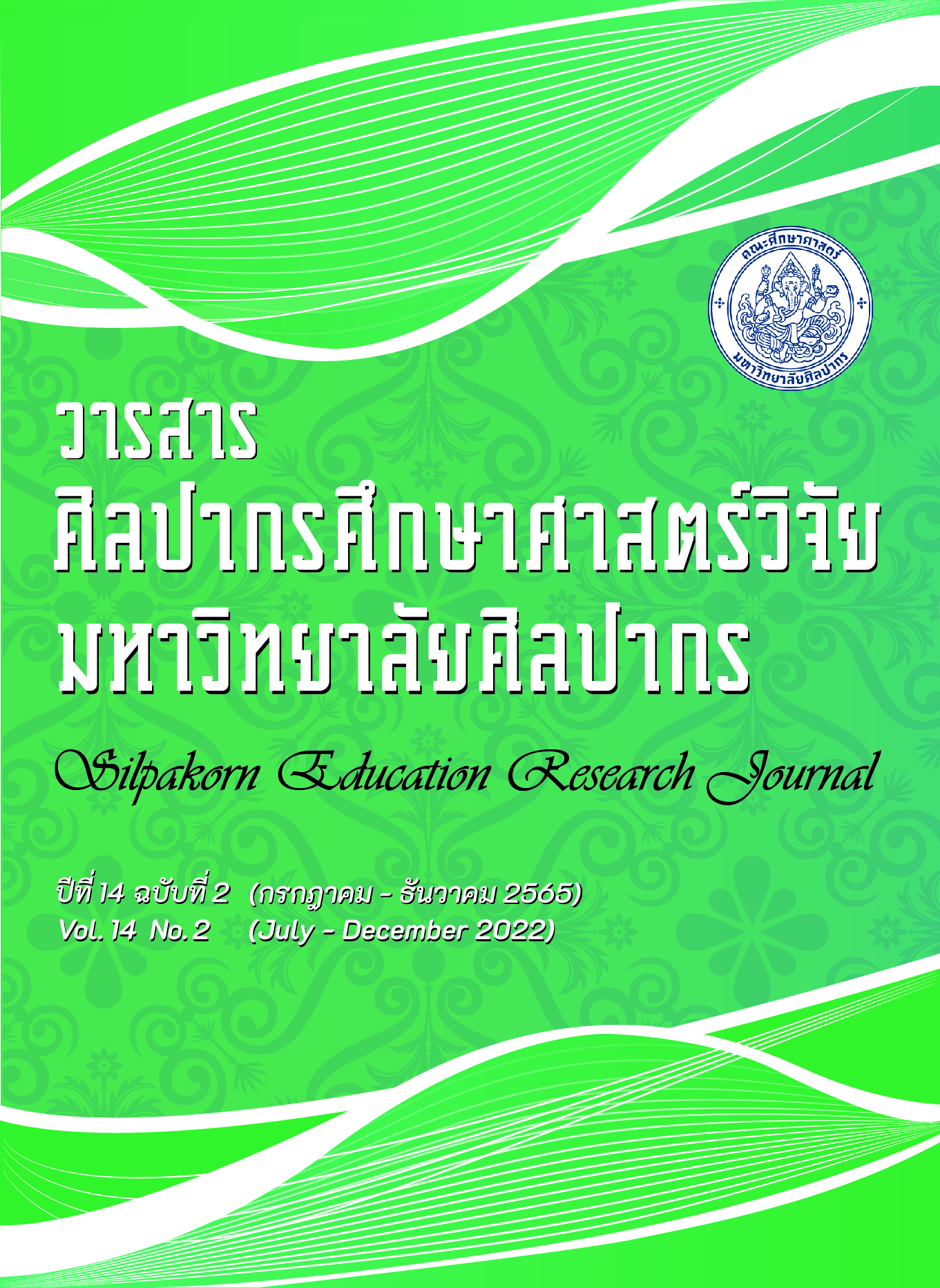การพัฒนาทักษะการคิดเชิงบริหาร โดยการจัดประสบการณ์การเรียนรู้ตามแนวคิด STEAM สำหรับเด็กปฐมวัย
คำสำคัญ:
แนวคิดสตีม/ ทักษะการคิดเชิงบริหาร/ เด็กปฐมวัยบทคัดย่อ
การวิจัยครั้งนี้มีวัตถุประสงค์เพื่อ 1) พัฒนาแนวทางการจัดประสบการณ์ตามแนวคิด STEAM ที่ส่งเสริมทักษะการคิดเชิงบริหาร และ 2) เปรียบเทียบทักษะการคิดเชิงบริหารของเด็กปฐมวัยก่อนและหลังการจัดประสบการณ์การเรียนรู้ตามแนวคิด STEAM กลุ่มเป้าหมาย คือ เด็กชั้นอนุบาลปีที่ 3/2 โรงเรียนวัดดอนทราย (สุวรรณรัฐราษฎร์อุปถัมภ์) จำนวน 15 คน ได้มาจากการเลือกแบบเจาะจง (Purposive Sampling) การดำเนินการวิจัยแบ่งเป็น 2 ระยะ คือ ระยะที่ 1 การพัฒนาแนวทางการจัดประสบการณ์การเรียนรู้ตามแนวคิด STEAM สำหรับเด็กปฐมวัย และระยะที่ 2 การดำเนินการทดลอง ผลการวิจัยพบว่า 1) การพัฒนาแนวทางการจัดประสบการณ์ตามแนวคิด STEAM ที่ส่งเสริมทักษะการคิดเชิงบริหาร ประกอบด้วย 5 ขั้นตอน ดังนี้ ขั้นตอนที่ 1 การสร้างความสนใจและระบุปัญหา ขั้นตอนที่ 2 การรวบรวมข้อมูล ขั้นตอนที่ 3 การวางแผนและการออกแบบกิจกรรม ขั้นตอนที่ 4 การดำเนินกิจกรรม และขั้นตอนที่ 5 การนำเสนอ และสรุป โดยผลการประเมิน ความเหมาะสมของแนวทางการจัดประสบการณ์การเรียนรู้ตามแนวคิด STEAM สำหรับเด็กปฐมวัยอยู่ในระดับมากที่สุด และ 2) ทักษะการคิดเชิงบริหารของเด็กปฐมวัยหลังการจัดประสบการณ์การเรียนรู้ตามแนวคิด STEAM สูงกว่าก่อนการจัดประสบการณ์การเรียนรู้ตามแนวคิด STEAM โดยผลการประเมินทักษะการคิดเชิงบริหารก่อนการจัดประสบการณ์การเรียนรู้ตามแนวคิด STEAM มีคะแนนเฉลี่ยเท่ากับ 1.23 ส่วนเบี่ยงเบนมาตรฐาน เท่ากับ 0.17 อยู่ในระดับน้อย หลังการจัดประสบการณ์การเรียนรู้ตามแนวคิด STEAM มีคะแนนเฉลี่ยเท่ากับ 2.77 ส่วนเบี่ยงเบนมาตรฐานเท่ากับ 0.21 อยู่ในระดับมาก และคะแนนการเปลี่ยนแปลงสัมพัทธ์ เท่ากับ 87.27
เอกสารอ้างอิง
Chaipang, O., and Srisurak, C. (2020). “The Using of Cooking Activities to Promote Frontal
Brain Skills for Early Childhood”. Rampang Rajabhat University Journal 10(1): 166-175. (in Thai)
Chumai, T. (2016). “Early Childhood Growth and Development”. Hua Hin Sook Jai Klai
Kangwon Journal 1(2): 18-33. (in Thai)
Chutabhakdikul, N., Thanasetkorn, P., and Lertawasdatrakul, O. (2017). Tool Development
and Evaluation Criteria for Assessment of Executive Function in Early Childhood. Nakhonpathom: Institute of Molecular Biosciences, Mahidol University. (in Thai)
DeJarnette, N. (2018). “Implementing STEAM in the Early Childhood Classroom.” European
Journal of STEM Education 3(3): 1-9.
Harnmetee, S. (2015). EF Immunity and Drug Prevention. Bangkok: Pimdee Company.
(in Thai)
Imnamkhao, S., and Siripul, P. (2020). “Executive Function in Early Childhood: A Concept
Analysis”. Nursing Journal of the Ministry of Public Health 30(3): 19-20. (in Thai)
Israsena Na Ayudhya, W. (2016). Things to Know About STEM Education. Bangkok:
Chulalongkorn University Press. (in Thai)
Jongsatitwatthana, K. (2014). STREAM Approach with Learning Management to Create
Essential Skills in the 21st Century. [Online]. Retrieved September 1, 2018, from https://www.nanmeebooks.com/download/EDUCA-STREAMApproach_KimChongsatit
watana.pdf. (in Thai)
Kanjanawasee, S. (2013). Classical Test Theory. Bangkok Chulalongkorn University Press.
(in Thai)
Khowtakool, S. (2013). Educational Psychology. Bangkok: Chulalongkorn University Press.
(in Thai)
Kraiwan, H., and Lehmongkol, P. (2017). “Learning Experience Provision of the STEAM
Education on Preschool Children’s Creative Problem Solving Ability”. Journal of Kasetsart Educational Review 31(1): 123-133. (in Thai)
Nillapun, M. (2015). Education Research Methodology. Nakhonpathom: Silpakorn
University Press. (in Thai)
Ooppakarn, D., and Yanachai, O. (2018). “What Principle Should We Use to Enhance
Learning Development of Early Childhood Children: “Brain Based Learning” or “Executive Functions”. Veridian E-Journal, Silpakorn University 11(1): 1635-1651.
(in Thai)
Pienpiemsin, S. (2018). Early Childhood Education. Bangkok: Graphic Site Media and
Publishing Service Center. (in Thai)
Pongern, W. (2017). “STEAM, Arts for STEM Education: Improvement in Perception, Capacity
and Inspiration for Children”. Journal of Education Studies 45(1): 320-334. (in Thai)
Puttikul, P., et al. (2020). “Development of Instructional Model Based on STEAM Education
to Enhance Problem Solving Thinking of Young Children”. Phranakhon Rajabhat Journal 15(1): 408-421. (in Thai)
Sonboon, C. (2021). “Effect of Learning Experience Management by Implementing MATH-3C
Learning Model on Executive Function Skills of Kindergarteners”. Journal of Education Burapha University 32(3): 24-39. (in Thai)
Tantiphlachiva, K. (2008). Learning Activities for Early Childhood. Bangkok: Mitsanpan
Graphic Press. (in Thai)
Tayea, F., Mophan, N., and Waedrama, M. (2017). “Effect of STEAM Education on Science
Learing Achievement, Creative Thinking and Satisfaction of Grade 5 Studentstowards the Learning Management”. Princess of Naradaiwas University Journal of Humanities and Social Sciences 4(2): 1-14. (in Thai)
ThaiHealth Promotion Foundation and Rakluke Learning Group. (2019). Development Guide
of Executive Function Skills. Bangkok: Eakpimthai Company. (in Thai)





